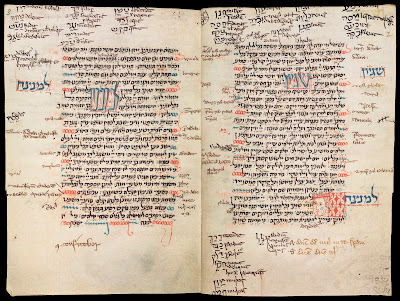Psalm 57 - Be merciful to me
Jump to end of psalm
To the leader: Do Not Destroy. Of David. A Miktam, when he fled from Saul, in the cave.
1) Be merciful to me, O God, be merciful to me,
for in you my soul takes refuge;
in the shadow of your wings I will take refuge,
until the destroying storms pass by.
2) I cry to God Most High,
to God who fulfills his purpose for me.
3) He will send from heaven and save me,
he will put to shame those who trample on me. Selah
God will send forth his steadfast love and his faithfulness.
4) I lie down among lions
that greedily devour human prey;
their teeth are spears and arrows,
their tongues sharp swords.
5) Be exalted, O God, above the heavens.
Let your glory be over all the earth.
6) They set a net for my steps;
my soul was bowed down.
They dug a pit in my path,
but they have fallen into it themselves. Selah
7) My heart is steadfast, O God,
my heart is steadfast.
I will sing and make melody.
8) Awake, my soul!
Awake, O harp and lyre!
I will awake the dawn.
9) I will give thanks to you, O Lord, among the peoples;
I will sing praises to you among the nations.
10) For your steadfast love is as high as the heavens;
your faithfulness extends to the clouds.
11) Be exalted, O God, above the heavens.
Let your glory be over all the earth.
Psalm 57 (NRSV*)
Not included in the Revised Common Lectionary.
This psalm has one of the most detailed superscriptions. These are not part of the psalm text itself, but included in early Greek and Hebrew manuscripts. They are primarily descriptive and technical notations. Miktam is found only in the supercriptions of six psalms of David, (16, 56-60). Related to the Babylonian word nakamu, "lid, metal cover for a vessel," its meaning in the psalm context is unknown. In Psalm 57, the psalm is attributed to a specific set of circumstances, when David "fled from Saul, in the cave" (1 Samuel 19-22, or perhaps through 1 Samuel 24).
It must be said, there are no really obvious connections between the stories told of David and Saul and this psalm, except in the very general sense of seeking deliverance from enemies.
One can, however, imagine a David, who is simultaneously beset by enemies who seek his life, and confident, even giddy, in his praise-singing soul. Nowadays we might see David as bipolar, alternating between lows where he would hide away, and highs where he leapt into battle, danced naked at the head of a triumphal procession, and celebrated his partnership with the Lord. (Perhaps it was this very character which made him at first sympatico to the moody Saul...)
Without pushing this into a clinical space, is this kind of David worthy of our attention? We all have an emotional range. Can we be attentive to the Lord in good times and bad, when we are brought low and when we are exalted? It's easy enough to rejoice when out enemies are caught in their own trap - but can our hearts be steadfast even in the Pit?
I will give thanks to you, O Lord, among the peoples... for your steadfast love is as high as the heavens. What better place to take refuge?
Credits:
Rembrandt van Rijn, An extinct Cape Lion (Panthera leo melanochaitus), 1650-52. Louvre, Paris. Public domain.
Superscriptions. Wikipedia: Miktam. * New Revised Standard Version Bible (NRSV), copyright © 1989 the Division of Christian Education of the National Council of the Churches of Christ in the United States of America. Used by permission. All rights reserved.
To the leader: Do Not Destroy. Of David. A Miktam, when he fled from Saul, in the cave.
1) Be merciful to me, O God, be merciful to me,
for in you my soul takes refuge;
in the shadow of your wings I will take refuge,
until the destroying storms pass by.
2) I cry to God Most High,
to God who fulfills his purpose for me.
3) He will send from heaven and save me,
he will put to shame those who trample on me. Selah
God will send forth his steadfast love and his faithfulness.
4) I lie down among lions
that greedily devour human prey;
their teeth are spears and arrows,
their tongues sharp swords.
5) Be exalted, O God, above the heavens.
Let your glory be over all the earth.
6) They set a net for my steps;
my soul was bowed down.
They dug a pit in my path,
but they have fallen into it themselves. Selah
7) My heart is steadfast, O God,
my heart is steadfast.
I will sing and make melody.
8) Awake, my soul!
Awake, O harp and lyre!
I will awake the dawn.
9) I will give thanks to you, O Lord, among the peoples;
I will sing praises to you among the nations.
10) For your steadfast love is as high as the heavens;
your faithfulness extends to the clouds.
11) Be exalted, O God, above the heavens.
Let your glory be over all the earth.
Psalm 57 (NRSV*)
Not included in the Revised Common Lectionary.
This psalm has one of the most detailed superscriptions. These are not part of the psalm text itself, but included in early Greek and Hebrew manuscripts. They are primarily descriptive and technical notations. Miktam is found only in the supercriptions of six psalms of David, (16, 56-60). Related to the Babylonian word nakamu, "lid, metal cover for a vessel," its meaning in the psalm context is unknown. In Psalm 57, the psalm is attributed to a specific set of circumstances, when David "fled from Saul, in the cave" (1 Samuel 19-22, or perhaps through 1 Samuel 24).
It must be said, there are no really obvious connections between the stories told of David and Saul and this psalm, except in the very general sense of seeking deliverance from enemies.
One can, however, imagine a David, who is simultaneously beset by enemies who seek his life, and confident, even giddy, in his praise-singing soul. Nowadays we might see David as bipolar, alternating between lows where he would hide away, and highs where he leapt into battle, danced naked at the head of a triumphal procession, and celebrated his partnership with the Lord. (Perhaps it was this very character which made him at first sympatico to the moody Saul...)
Without pushing this into a clinical space, is this kind of David worthy of our attention? We all have an emotional range. Can we be attentive to the Lord in good times and bad, when we are brought low and when we are exalted? It's easy enough to rejoice when out enemies are caught in their own trap - but can our hearts be steadfast even in the Pit?
I will give thanks to you, O Lord, among the peoples... for your steadfast love is as high as the heavens. What better place to take refuge?
Credits:
Rembrandt van Rijn, An extinct Cape Lion (Panthera leo melanochaitus), 1650-52. Louvre, Paris. Public domain.
Superscriptions. Wikipedia: Miktam. * New Revised Standard Version Bible (NRSV), copyright © 1989 the Division of Christian Education of the National Council of the Churches of Christ in the United States of America. Used by permission. All rights reserved.




Comments
Post a Comment